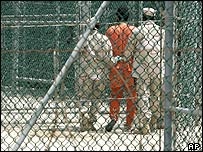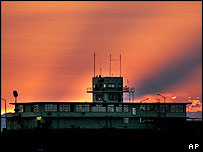Untitled Document
 |
Many prisoners are al-Qaeda
or Taleban suspects |
Dozens of detainees have joined a hunger strike at the Guantanamo Bay
prison camp, bringing the number refusing food to 128, US officials
say.
Eighteen prisoners have been hospitalised, including 13 who are being
tube-fed.
Lawyers for the detainees say they are demanding release or immediate trial.
This is the latest in a series of hunger strikes since 2002 by detainees, who
are held at the facility on Cuba as part of the US war on terror.
Lawyers for the detainees said as many as 200 were involved in the protest.
Many of the inmates have been held without charge for more than three years.
A hunger strike in July ended when the Pentagon agreed to talk to inmates.
The prison at Guantanamo holds about 500 prisoners from nearly 40 countries.
Starve to death
 |
The Pentagon says many prisoners have been sent home |
A spokesman for the detention centre, Capt John Adams, says all those inmates
hospitalised are being monitored by doctors at the camp, AFP news agency reports.
"Everyone is stable at this time. If their condition appears to weaken,
they will be brought to the hospital and either fed intravenously or nose fed,"
says Captain Adams.
During the previous hunger strike, the prisoners were monitored by medical professionals
and also admitted to hospital where necessary.
The New York-based Center for Constitutional Rights (CCR), which has provided
lawyers for many detainees, say some prisoners have threatened to starve to
death unless they are put on trial or released, the Associated Press reports.
The US military has also denied claims by the CCR that at least three detainees
were abused by the military's Extreme Reaction Force, AP says.
The Pentagon says nearly 250 prisoners have been sent to their home countries
from Guantanamo since the prison operation began.
An Afghan prisoner sent back two days ago was identified by Afghan state television
as Mullah Abdul Salam Zaeef, the former Taleban ambassador to Pakistan, Reuters
news agency reports.
Many of the prisoners are al-Qaeda and Taleban suspects detained during the
2001 war in Afghanistan.
As most inmates are held as enemy combatants they are not protected by the
Geneva Convention and can be held indefinitely, the US government says.

